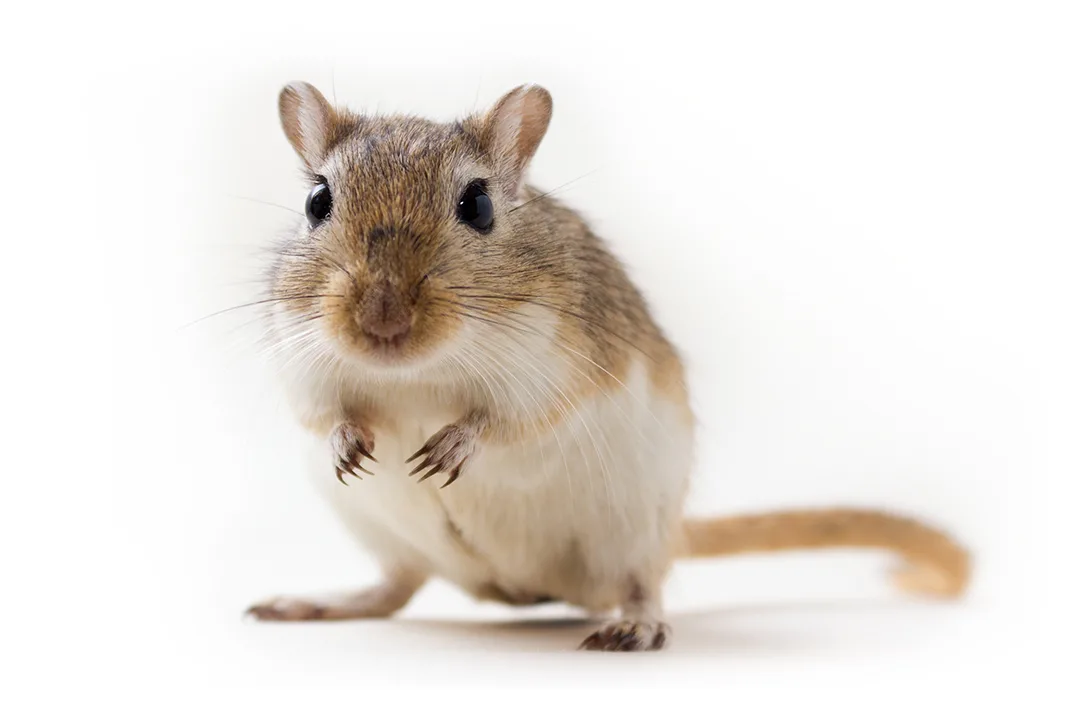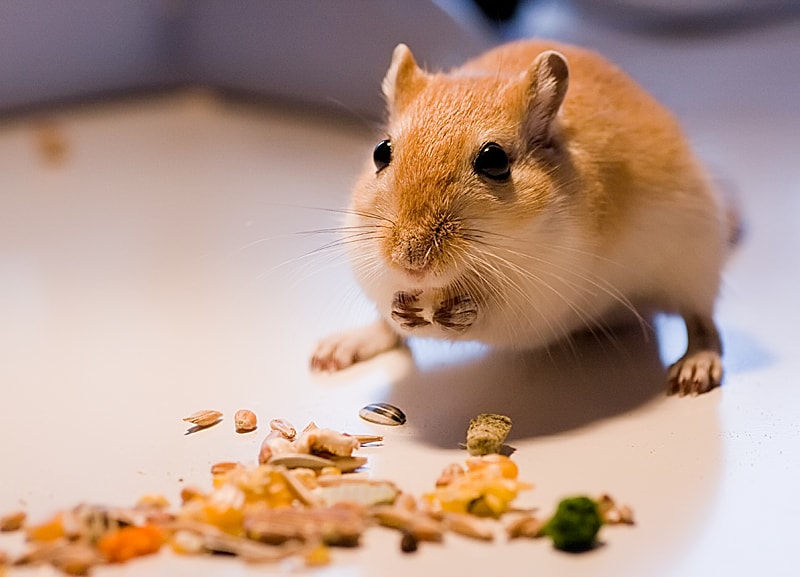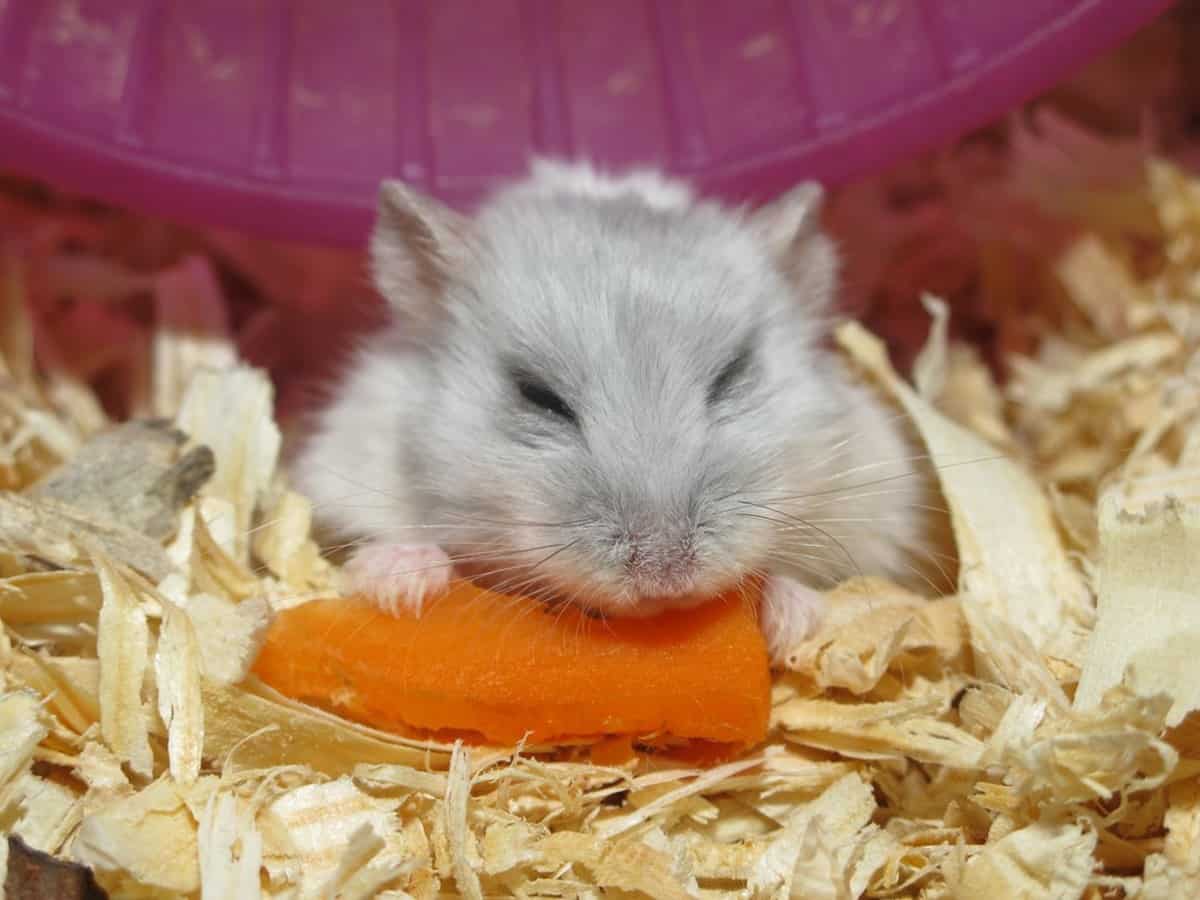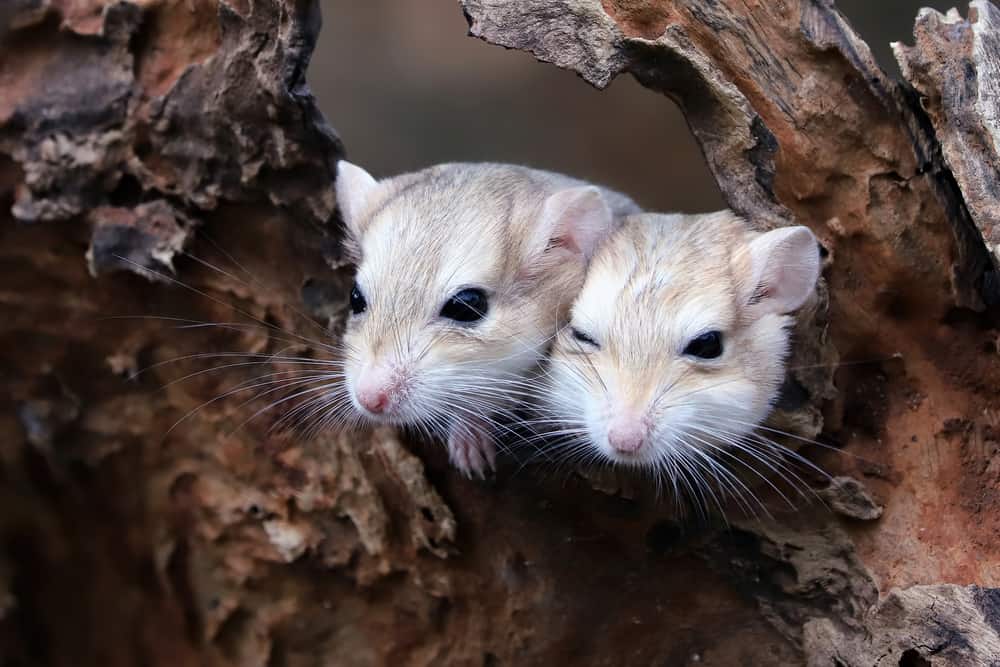Have you recently bought a gerbil or two and have no idea what to feed them? Are you thinking about getting a gerbil and want to know ahead of time what foods they can and can’t eat? Do you want to know what other foods to give them for a variety in their diet?
Gerbils are sweet little animals and make for great pets. I have owned four in the past, once as a child and again as a teen, and I learned a lot about what they like and dislike. That, along with research, allowed me to write this article to answer these questions.
What are Gerbils?

Gerbils are small rodents that are smaller than a rat and bigger than a mouse. They are mostly nocturnal creatures who have a lovely temperament and tend to be more social and friendlier than a hamster.
They look much like a mouse, except their fur covers their entire body including the tail, and they usually have white, brown, grey, or black fur. They prefer to be kept in pairs or a group, though you should get two of the same gender, and they live around 3-4 years on average.
Gerbils originally came from Mongolia and can also be found in Africa and Asia. It is reported that they ended up as pets after they were brought to America for research purposes.
What Foods Can Gerbils Eat?
Wild gerbils eat a variety of foods according to the RSPCA, and the diet of a domesticated gerbil should follow a similar pattern. They have a diet that provides all the vitamins and nutrients they need to survive. A list of suitable foods to fill their food dish with are:
Seeds

Seeds are a favourite for gerbils as they can easily hold them and nibble at them without effort. Many premade gerbil food mixes contain either a few different seeds or various types of pellets that have been tailored to their nutritional needs.
Sunflower seeds are a gerbil’s favourite food, but they must only be given sparingly as they have a high fat content. If given too often, they will become overweight as they will choose the sunflower seeds over any other foods.
Other seeds such as millet and linseed also have a high fat content, so even though gerbils enjoy eating them, only give them seeds occasionally. To make sure they don’t eat too many, buy a premade gerbil mix.
For a healthier seed alternative, try giving them pumpkin seeds. They should still enjoy them, but they have a lower fat content.
Pellets
Pellets are good for gerbils as they have been made to provide all the minerals and vitamins necessary to keep them healthy. It is a dry, low-fat, high-protein food, and will make up 75% of a gerbil’s diet.
They are usually made from ground seeds and grass and can be given alongside other treats such as some nuts, fruits, and vegetables.
Nuts
Nuts can be a lovely treat for your pet gerbil, and that they often eat them in the wild. They can safely have the following types of nuts:
- Raw Peanuts
- Pistachios
- Monkey Nuts
- Brazil Nuts
- Macadamia Nuts
- Pine Nuts
- Pecans
- Chestnuts (must be cooked, never raw)
Fruits
Fruit can only be given in small doses to avoid upsetting their delicate digestive systems. The maximum amount of fruit you can give to a gerbil is around 1 teaspoon per week. Some fruits suitable for gerbils include:
- Apples – gerbils can have apples in very limited amounts without the seeds due to the acidity, the amount of water and sugar, and eating too much can cause diarrhea. They contain fiber, pectin, Vitamin A, Magnesium, and Potassium.
- Bananas – this isn’t something wild gerbils would eat, but they enjoy them nonetheless. As with apples, eating too much of it can cause diarrhea.
The benefits include seizure prevention through the minerals in the fruit, which are Potassium, Magnesium, Copper, and Manganese, and they can be fed any banana regardless of how ripe or overripe it is.
- Berries – these are a part of a wild gerbil’s diet, so they are ideal to be given to your pet. They can have strawberries, blueberries, blackberries, and goji berries, and should be washed before you give it to your pet to get any chemicals or pesticides off.
You should limit the number of berries given, this time because of the sugar content as too much sugar can lead to diabetes and issues with their teeth.
The benefits include protein, fiber, essential minerals, and they provide gerbils with lots of energy.
Vegetables

Like fruit, vegetables can also only be fed to gerbils occasionally due to the high water content. The maximum amount is the same (one teaspoon) but you can only have one teaspoon of either per week, not one each, so choose wisely!
The following vegetables are suitable for gerbils, according to PetWebMD:
- Cucumber – helps to file down their teeth and is a nutritional snack that contains fats, carbohydrates, and essential proteins.
- Carrots – both carrots and carrot tops can be eaten by gerbils and contain Vitamin A, Vitamin K, a lot of water (so feed sparingly), and carbohydrates.
- Lettuce – lettuce leaves contain many minerals including Magnesium, Potassium, and Folate, but only some types of lettuce are suitable for gerbils. These types are Romaine, Leaf, and Butterhead. You must never give them Iceberg lettuce.
- Broccoli – this tends to be a gerbil’s favourite vegetable thanks to the unique texture and how easy it is to eat. It contains many vital vitamins such as Potassium, Calcium, and Vitamin K.
- Cabbage – cabbage is a safe treat for a gerbil as it has the perfect ratio of dietary components (protein, carbohydrates, and fats) to suit a gerbil’s nutritional needs. However, it isn’t high in vitamins, so it must be given as part of a balanced diet.
- Peas – peas can be given to gerbils either raw, fresh, or cooked. They contain many vitamins like Vitamin B1, Iron, Zinc, and Copper, many of which aren’t found in other vegetables.
- Other foods – Gerbils can also have rice, hay, unsweetened cereal, some cheeses, dry pasta, oats, scrambled eggs, and wholemeal breadcrumbs on occasion. They are also omnivores, and wild gerbils eat insects such as mealworms and crickets.
What Types of Food Can Kill Gerbils?
Some foods are so toxic to gerbils that they can end up being fatal if consumed. These include the following as per The Spruce Pets:
- Rhubarb
- Chocolate
- Citrus Fruits
- Onions
- Raw Potato
- Avocado
- Grapes
- Apple Seeds
- Raw Kidney Beans
Tips on Keeping Gerbils as Pets
Gerbils as pets tend to be fairly low maintenance, don’t take up much space, and can be an ideal pet for a beginner or for children. Below are some helpful tips when it comes to caring for your new pets:
- Clean their cage around once a week by changing the sawdust and getting rid of any stale food that has been stored away.
- Make sure they always have access to fresh food and clean water. Refresh the water in their bottle and clean out their food bowl once per day.
- Don’t put their cage in direct sunlight or permanent darkness. Pick a nice, cool spot within the house that still has lots of natural light.
- Get a cage big enough for them to roam around freely and play, as they need exercise and stimulation.
- Get them toys to occupy them and keep them engaged with their surroundings, because they can get bored and start chewing through the plastic parts of the cage.
- Empty toilet rolls are a great addition to a gerbil’s cage as they can chew on them and shred them, which also helps them maintain their teeth.
- Check that they are healthy and look out for signs that they are feeling unwell, such as a low appetite, diarrhea, less activity, and a dirty coat.
- Take them out of their enclosure every so often once they get used to being in your presence and handle them carefully. They like to scamper around and explore, so keep wires and other hazards out of reach!
A video giving guidance on caring for gerbils can be found here.
Conclusion
In summary, foods that are suitable for gerbils include:
- Seeds – pumpkin seeds are best, but sunflower seeds are also a favourite.
- Nuts – raw peanuts tend to be a favourite, but they can have many different types of nuts so long as they are prepared properly.
- Fruit – berries are eaten in the wild, and they love the taste of bananas, just avoid citrus fruits.
- Vegetables – broccoli is best for enjoyment and dietary fulfillment, but many others can also be given as treats.
- Other foods include eggs, hay, insects, cereal, bread, cheese, and uncooked pasta.
If you have any comments or queries about anything you have read, please let us know and we will get back to you soon!
